A 40-year-old man was bitten by a shark while surfing in the waters off New Smyrna Beach, Florida, on Tuesday morning, according to authorities.
Donald Walsh—a chiropractor from Mims—is the fourth person to be bitten by a shark in these waters in just the last month, and the eleventh in the whole of 2019, WESH 2 reported.
New Smyrna Beach—located on Florida's central east coast—is considered to be the "shark attack capital of the world," according to the International Shark Attack File (ISAF).
National Geographic reported that anyone who has entered the water in this area has likely come within 10 feet of a shark.
Walsh told Volusia County Beach Safety Ocean Rescue officials that he caught air on a wave while surfing and landed on top of a shark. The animal—which Walsh estimated to be around 6.5 feet long—then bit his hand and leg.
Fortunately, the injuries were not life-threatening and Walsh was subsequently treated on the beach by Ocean Rescue. He was not taken to hospital.
WESH 2 reporter Claire Metz tweeted about the incident: "Surfer bit on hand and calf during shark incident.. shark bit him once but interacted w/ hand and calf.. surfer declined transport to hospital... likely seeking help on his own."
The graphic below, provided by Statista, illustrates the number of unprovoked shark attacks around the world.

At present, it is unclear what species of shark may have been responsible for the attack.
Florida is the U.S. state where most shark attacks occur—indeed, it has the highest incidence of attacks in the world—although it should be noted that the number of bites dropped there last year.
As of August 22, there have been 35 confirmed shark bites in U.S. waters, with 20 of those occurring in the Sunshine State. Just one of these 35 attacks led to the death of the individual involved, according to the website Tracking Sharks.
The majority of shark attacks are considered to be "unprovoked," likely the result of the animals using their mouths in an exploratory manner to investigate objects that they perceive as food.
A minority of incidents are considered to be "provoked," meaning a human may have encouraged the attack in some way, by fishing or touching the shark, for example. Most cases involve the sharks taking a single, non-fatal bite before swimming away.
It is important to remember that shark attacks are actually very rare—and fatal incidents are even rarer.
Last year there were just 66 unprovoked attacks around the world—down from a global average of 85 over the past decade—according to the Florida Program for Shark Research. And it is estimated that the odds of being killed by a shark in your lifetime is just over one in 3.7 million, National Geographic reported.
As a comparison, you are more likely to die from being struck by lightning—a one in 79,746 chance over your lifetime, according to ISAF.

Uncommon Knowledge
Newsweek is committed to challenging conventional wisdom and finding connections in the search for common ground.
Newsweek is committed to challenging conventional wisdom and finding connections in the search for common ground.
About the writer
Aristos is a Newsweek science reporter with the London, U.K., bureau. He reports on science and health topics, including; animal, ... Read more
To read how Newsweek uses AI as a newsroom tool, Click here.








